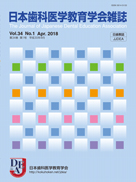
- Issue 3 Pages 96-
- Issue 2 Pages 63-
- Issue 1 Pages 3-
- |<
- <
- 1
- >
- >|
-
SUGIMOTO Kyoko, NISHI Yasuhiro, MINAMI Hiroyuki2023Volume 39Issue 2 Pages 63-69
Published: 2023
Released on J-STAGE: August 20, 2023
JOURNAL FREE ACCESSAbstract As the aging of society in Japan has progressed, the Faculty of Dentistry of Kagoshima University introduced simulation training of the elderly using equipment in the first phase of clinical training in 2020 in order to deepen physical understanding of the elderly. This training is conducted as part of the practice of home-visit dental care simulation training, which has been carried out using a simulator and portable treatment equipment based on a scenario that assumes providing dental treatment at the visiting site. Seven types of equipment were used in the simulation training for the elderly : earmuffs, goggles to simulate the visually impaired, elbow/knee supporters, weight bands for wrists/ankles, and belts for bending forward. We let the dental students experience walking, going up and down stairs, and unlocking a numeric keypad of a door. During the practical training, many students had difficulty going up and down stairs in a stooped posture and with narrowed vision, and they often asked for support from their caregivers, who naturally gave them assistance. In the post-training questionnaire survey, more than half of the students said that their impressions of the elderly had changed after the training. It is thought that actually experiencing the physical burden and hardships that the elderly feel physically in their daily lives was highly significant, and increased the students’ awareness. It is suggested that this training increased understanding of the physical characteristics of the elderly. In the future, we are considering enhancing the training content to raise students’ understanding further.
View full abstractDownload PDF (873K) -
TAYA Yuji, TANAKA Tomoko, TASHIRO Yumiko, NAGAURA Madoka, TOCHIGI Keis ...2023Volume 39Issue 2 Pages 70-79
Published: 2023
Released on J-STAGE: August 20, 2023
JOURNAL FREE ACCESSAbstract LTD based PBL (LBP) is Problem Based Learning (PBL) based on the cooperative learning technique Learning Through Discussion (LTD). The LBP technique was utilized in a class called “LTD based PBL (LBP)” for first-year students of the Nippon Dental University School of Life Dentistry at Tokyo. The LBP classes were conducted in the following education formats : all online in FY2020, both online and face-to-face in FY2021, and all face-to-face in FY2022. In this study, we conducted a comparative analysis of student questionnaire surveys on small-group activities between online and face-to-face class formats in LBP. In the survey on whether LBP is viable as the students experienced the full or partial online class format in both FY2020 and FY2021, approximately 60% of students responded affirmatively that the Zoom breakout room was sufficient for interaction, compared to less than 10% of students who responded negatively. Furthermore, in terms of the LBP class format a much higher percentage of students preferred face-to-face LBP compared to online. Moreover, it was indicated that “presenting,” “listening,” “speaking up,” and “discussing” were all easier for many students to conduct face-to-face than online. It was inferred that the Internet environment, Zoom functionality and screen-mediated discussions in the online format presented difficulties for the students. However, it was also indicated that the online class format allows for a certain level of group activity through the use of breakout rooms with an improved Internet environment, but requires some devices in terms of video-on status and the use of whiteboard function applications.
View full abstractDownload PDF (635K)
- |<
- <
- 1
- >
- >|